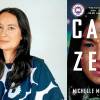Boston-based author Kayla Cottingham’s latest young adult novel, “This Delicious Death” is a sapphic horror where a small percentage of the population underwent a transformation called “the Hollowing” which gave individuals an appetite for human flesh. Two years after the crisis, scientists developed a synthetic version of human meat called “Synflesh” that satisfied the craving of the “Ghouls.”
The book centers around a group of four "hollow" girls who travel to a music festival in Southern California to celebrate their high school graduation, equipped with a cooler full of booze and synthetic human flesh. When one friend suddenly kills and eats a member of an indie band, the girls investigate what’s gone awry.
Cottingham’s debut YA novel, “My Dearest Darkest,” was a New York Times bestseller. Ahead of the release of “ This Delicious Death,” out April 25, Cottingham spoke with GBH News about the novel. Excerpts from the interview are below, and you can hear the full interview.
Haley Lerner: Where did you get the idea to write “This Delicious Death”?
Kayla Cottingham: I was really fascinated when that whole series of Fyre Festival documentaries came out after that went so dramatically wrong. I had this idea floating around to do a music festival book because of the high stakes stuff that was presented.
I wound up shifting a little bit to this pandemic because we had a pandemic and still do. And it sort of slotted in nicely as a way to discuss a lot of specifically queer and trans issues along with the pandemic, and just doing it in this high tension setting of a music festival that you don't see very much in books.
Lerner: Your book includes a sapphic love story, and there is other representation of the LGBTQ community throughout the book. How is representation important to you when writing?
Cottingham: I wanted to reflect the world that I see, which is one that is full of a lot of different gender identities and sexualities and skin colors. And to look at the world and say, "oh, this is just white and cis and heterosexual" is just not the world that I live in. I wanted to be able to take all of the people that I care about and represent them in the written form, which is where a lot of the characters came from. A lot of them are based at least partially on real people.
Lerner: With a lot of apocalyptic and zombie stories going around, you have very specific details in your world. You have “the Hollowing” and inventions such as the tracking app for Ghouls, “Hollow Life” and “SynFlesh,” which is like a synthetic human flesh. How did you go about creating this specific world and the consequences that come with it?
Cottingham: I wanted it to be this world where everyone has gone through this huge collective trauma. Not exactly in the way that we have with COVID, but in a similar way where everyone has come out of it changed either mentally or physically. Everything is different now, but people still want to cling to that sort of before times way of being where it's like, well, we've been through this horrible event and we just want to go and have like a fun chill time at a music festival instead of thinking about all of the horrible things that have happened to us.
And that was where SynFlesh came in, which is the, you know, obviously synthetic human flesh that the main characters who are Ghouls eat. So it kind of gives them a way to live amongst normal human beings.
Lerner: When writing a YA horror book, how do you keep the tone fun and comedic while also still including those traditional gory elements which you did in your book?
Cottingham: I think part of the fun about writing about teenagers is that specifically with the generation of teenagers now, they've all been through so much and as a result, they have this very specific sense of humor about the world around them, sort of as a coping mechanism. These girls have been through hell and back, but they're still cracking jokes.
Lerner: You really fleshed out the main four girls in the book, even though obviously Zoe is our main character. You went into the backgrounds of how all these girls became Ghouls, as they're called in the book. Can you explain the process of making sure that each of these four girls had their own backstories and their own journeys to get where they ended up in the present in the book?
Cottingham: I think a big part of it I owe to the really wonderful sensitivity of readers that we had because I did want to tell stories that were specific to the girls' identities. So if you look at Jasmine, for example, in her flashbacks, she's sort of trying to protect her little brother in this post-apocalyptic scenario in Los Angeles. And she comes across these really horrible white supremacists who basically don't want to treat her — she’s black — or her little brother like they're human beings.
I made sure that we had outside readers come in and look at those scenes and say if this is an accurate representation and make sure that it was as sort of true to life and faithful as I could be and not speaking outside of my experience.
Lerner: Overall, what do you hope people get out of this book?
Cottingham: I would really like for people to feel seen. It's a book that has a lot to do with the current climate and it speaks specifically to the experiences of queer people and minorities in the way that society tends to label us as monsters. And so I just kind of took that and made it kind of literal. And I did that with the intention of shining a light on understanding that we are all just people. There's nothing actually different about how we feel or act.
Kayla Cottingham will be at All She Wrote Books in Somerville on April 25 at 7 p.m. for the book launch of “This Delicious Death.” Cottingham will be interviewed by Jenna Niedzwiecki and sign books at the event. More information can be found
here.








